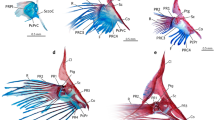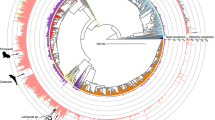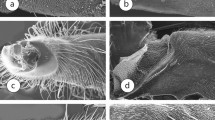Abstract
RISSER1 was unable to demonstrate organs of taste in the mouth of the frog tadpole. More recently Helff and Mellicker2 and Hammerman3–6 have described lingual premetamorphic papillae on the tongue anlage of the frog. These investigators believe, on anatomical evidence, that the papillae serve as a taste sensor. This communication reports a behavioural study which was aimed at providing further evidence for a gustatory function of the lingual premetamorphic papillae.
This is a preview of subscription content, access via your institution
Access options
Subscribe to this journal
Receive 51 print issues and online access
$199.00 per year
only $3.90 per issue
Buy this article
- Purchase on Springer Link
- Instant access to full article PDF
Prices may be subject to local taxes which are calculated during checkout
Similar content being viewed by others
References
Risser, J., J. Exp. Zool., 16, 617 (1914).
Helff, O. M., and Mellicker, M. C., Amer. J. Anat., 68, 339 (1941).
Hammerman, D. L., thesis, New York Univ. (1959).
Hammerman, D. L., Anat. Rec., 137, 362 (1960).
Hammerman, D. L., Amer. Zool., 4, 319 (1964).
Hammerman, D. L., Amer. Zool., 6, 603 (1966).
Author information
Authors and Affiliations
Rights and permissions
About this article
Cite this article
HAMMERMAN, D., THOMAS, R. Lingual Premetamorphic Papillae as Larval Taste Structures in Frogs. Nature 215, 98–99 (1967). https://doi.org/10.1038/215098a0
Received:
Issue Date:
DOI: https://doi.org/10.1038/215098a0
Comments
By submitting a comment you agree to abide by our Terms and Community Guidelines. If you find something abusive or that does not comply with our terms or guidelines please flag it as inappropriate.



